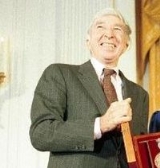
writer, art critic
, and literary critic.
Updike's most famous work is his Harry "Rabbit" Angstrom series (the novels Rabbit, Run
; Rabbit Redux
; Rabbit Is Rich
; Rabbit At Rest
; and the novella "Rabbit Remembered
"), which chronicles Rabbit's life over the course of several decades, from young adulthood to his death. Both Rabbit Is Rich (1981) and Rabbit At Rest (1990) received the Pulitzer Prize
. Updike is one of only three authors (the others were Booth Tarkington
and William Faulkner
) to win the Pulitzer Prize for Fiction more than once.
The city overwhelmed our expectations. The Kiplingesque grandeur of Waterloo Station, the Eliotic despondency of the brick row in Chelsea … the Dickensian nightmare of fog and sweating pavement and besmirched cornices.![]()
If men do not keep on speaking terms with children, they cease to be men, and become merely machines for eating and for earning money.![]()
A healthy male adult bore consumes each year one and a half times his own weight in other people's patience.![]()
The refusal to rest content, the willingness to risk excess on behalf of one's obsessions, is what distinguishes artists from entertainers, and what makes some artists adventurers on behalf of us all.![]()
I would especially like to recourt the Muse of poetry, who ran off with the mailman four years ago, and drops me only a scribbled postcard from time to time.![]()
Suspect each moment, for it is a thief, tiptoeing away with more than it brings.![]()
When I write, I aim in my mind not toward New York but toward a vague spot a little to the east of Kansas.![]()
Each morning my characters greet me with misty faces willing, though chilled, to muster for another day's progress through the dazzling quicksand the marsh of blank paper.![]()
I think “taste” is a social concept and not an artistic one. I’m willing to show good taste, if I can, in somebody else’s living room, but our reading life is too short for a writer to be in any way polite. Since his words enter into another’s brain in silence and intimacy, he should be as honest and explicit as we are with ourselves.![]()
I love my government not least for the extent to which it leaves me alone.![]()

